Rome’s Most Wanted Enemy – Poison King Mithradates Murdered 80,000 Roman Civilians
Ellen Lloyd - AncientPages.com - In the autumn of 88 B.C., more than 80,000 Roman civilians were murdered. The "mastermind" behind this gruesome attack was Mithradates VI Of Pontus (120-63 BCE), the Poison King.
When news about the horrible massacre reached the Roman Republic, King Mithradates was declared Rome’s ‘most wanted enemy. General Sulla (138 B.C. -79 B.C.) was ordered to seek and destroy the man who was considered a considerable threat to the Roman Republic. However, this was not an easy task, and the wars between King Mithradates and Rome would drag on for decades, spanning two continents.
Left: King Mithradates. Credit: Public Domain - Right: Roman army. Credit: yeowatzup - CC BY 2.0
As Ancient Pages wrote earlier, King Mithradates was often referred to as the Poison King because he was a brilliant toxicologist. He was obsessed with poison and took small doses of a specially prepared poison to help him develop resistance if some should try to poison him.
King Mithradates Wanted To Create An Empire As Powerful As Rome
Mithradates ruled a small but wealthy kingdom on the Black Sea, but his goal was to create a powerful empire to rival Rome’s expanding dominions. Mithradates, who had murdered his own mother to become king, hated the Roman Empire. He regarded “Romans as the enemy of all humanity.”
He recruited ethnically diverse armies from distant lands and carefully looked for weaknesses in the Roman Republic. Perfectly aware of peoples’ dissatisfaction with the expansion of the Roman Empire and the tax burden, King Mithradates used the opportunity to strike back.
In 146 B.C., the Western part of the Mediterranean region and Greece were already under the control of the Roman Empire. In 133 B.C., the Roman Empire expanded and seized Pergamon in the western part of Asia Minor.
Unfair Taxes Ruined Peoples’ Lives
It was not long before Roman colonizers, traders, and tax collectors moved into the province.
The tax collectors were private individuals who demanded huge sums from locals. With the Roman Empire's support, these tax collectors ruined the lives of many poor people. Some families who could afford the demanded tax had to sell their children to pay. Things went so far that even the Romans acknowledged that they had lost control of the tax collection in the new province. People had many reasons to hate Roman rule.
Map of the Kingdom of Pontus, Before the reign of Mithridates VI (dark purple), after his conquests (purple), his conquests in the first Mithridatic wars (pink), and Pontus' ally, the Kingdom of Armenia (green). Credit: Wikipedia
In 88 B.C., a massacre of more than 80,000 unsuspecting civilians took place in Anatolia (western Turkey). The victims were Roman and Italian merchants, slave traders, and tax collectors, the deeply detested settlers in Rome’s new province of Asia. The massacre, carried out by ordinary Anatolians, Greeks, Jews, and other citizens of more than a dozen cities, wiped out the Roman presence in the region.
The organizer of the massacre was King Mithradates. This was the beginning of a long war between the Roman Empire and King Mithradates, legendary ruler of Pontus and creator of a formidable Black Sea Empire.
It took a long time, but finally, Mithridates and his troops were defeated by the Romans, and the king had to go into exile
Written by Ellen Lloyd – AncientPages.com
Updated on Septermber 18, 2022
Copyright © AncientPages.com All rights reserved. This material may not be published, broadcast, rewritten or redistributed in whole or part without the express written permission of AncientPages.com
Expand for referencesMatyszak P. Mithridates the Great: Rome’s indomitable enemy
Peter J. Fast – Mithridates VI of Pontus: The Poison King Who Hated Rome
Mayor A. : The Poison King
More From Ancient Pages
-
 Archaeologists Uncover More Hidden Ancient Secrets In Saqqara, Egypt
Archaeology | Jan 6, 2025
Archaeologists Uncover More Hidden Ancient Secrets In Saqqara, Egypt
Archaeology | Jan 6, 2025 -
 12,000-Year-Old Rock Art In North America – Dating Petroglyphs In The American West
Archaeology | Mar 4, 2022
12,000-Year-Old Rock Art In North America – Dating Petroglyphs In The American West
Archaeology | Mar 4, 2022 -
 Infamous End Of Lugalzagesi – Ambitious King Who United Sumer
Featured Stories | Apr 30, 2020
Infamous End Of Lugalzagesi – Ambitious King Who United Sumer
Featured Stories | Apr 30, 2020 -
 Mystery Of Hizir – One Of The Most Enigmatic And Extraordinary Ancient People
Ancient Mysteries | Oct 16, 2018
Mystery Of Hizir – One Of The Most Enigmatic And Extraordinary Ancient People
Ancient Mysteries | Oct 16, 2018 -
 Controversial Roman Emperor Heliogabalus Wanted To Be A Woman And Much More
Featured Stories | Jun 14, 2020
Controversial Roman Emperor Heliogabalus Wanted To Be A Woman And Much More
Featured Stories | Jun 14, 2020 -
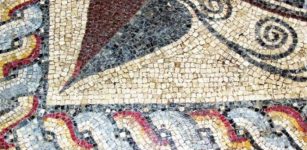 1,800-Year-Old Villa Of Famous Ancient Fisherman Phainos Unearthed In Turkey
Archaeology | Jun 20, 2018
1,800-Year-Old Villa Of Famous Ancient Fisherman Phainos Unearthed In Turkey
Archaeology | Jun 20, 2018 -
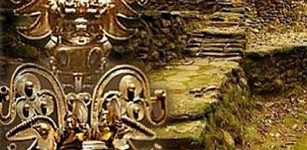 Mysterious Lost City Of The Tairona Hidden In The Jungles Of Colombia
Civilizations | Nov 9, 2018
Mysterious Lost City Of The Tairona Hidden In The Jungles Of Colombia
Civilizations | Nov 9, 2018 -
 Story Behind The Two Keys On Vatican’s Flag
Ancient History Facts | Feb 28, 2018
Story Behind The Two Keys On Vatican’s Flag
Ancient History Facts | Feb 28, 2018 -
 How An Old Norse Poem Changed Biblical Studies
Linguistic Discoveries | Aug 4, 2025
How An Old Norse Poem Changed Biblical Studies
Linguistic Discoveries | Aug 4, 2025 -
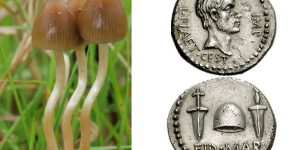 Strange Tale How The Liberty Cap Mushroom Got Its Name Starts In Ancient Rome
Featured Stories | Sep 3, 2023
Strange Tale How The Liberty Cap Mushroom Got Its Name Starts In Ancient Rome
Featured Stories | Sep 3, 2023 -
 On This Day In History: Most Unusual Emperor Renzong Of Song Dynasty Was Born – On May 30, 1010
News | May 30, 2016
On This Day In History: Most Unusual Emperor Renzong Of Song Dynasty Was Born – On May 30, 1010
News | May 30, 2016 -
 The Writing Ball: A Great Invention In 1870
Ancient History Facts | Jun 30, 2016
The Writing Ball: A Great Invention In 1870
Ancient History Facts | Jun 30, 2016 -
 On This Day In History: Mary Queen Of Scots Was Forced To Abdicate – On July 24, 1567
News | Jul 24, 2016
On This Day In History: Mary Queen Of Scots Was Forced To Abdicate – On July 24, 1567
News | Jul 24, 2016 -
 Genome Study Reveals How Human Populations Adapted, Survived, And Diversified In The Himalayas
DNA | Jul 16, 2025
Genome Study Reveals How Human Populations Adapted, Survived, And Diversified In The Himalayas
DNA | Jul 16, 2025 -
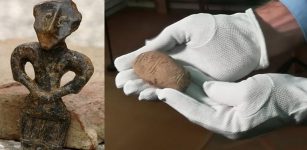 7,000-Year-Old Inscription With Undeciphered Vinca Script – One Of The World’s Earliest Writing Systems Discovered
Archaeology | Feb 17, 2018
7,000-Year-Old Inscription With Undeciphered Vinca Script – One Of The World’s Earliest Writing Systems Discovered
Archaeology | Feb 17, 2018 -
 Irish God Ogma – Outstanding Warrior And Inventor Of The Ogham Script
Myths & Legends | Jul 3, 2024
Irish God Ogma – Outstanding Warrior And Inventor Of The Ogham Script
Myths & Legends | Jul 3, 2024 -
 Vimanas Of The Rama Empire: Flying Machines Dominated Ancient Skies In Distant Past
Ancient Technology | Jul 23, 2017
Vimanas Of The Rama Empire: Flying Machines Dominated Ancient Skies In Distant Past
Ancient Technology | Jul 23, 2017 -
 Athena – Goddess Of Wisdom Delivered Punishments And Gifts
Featured Stories | Dec 31, 2018
Athena – Goddess Of Wisdom Delivered Punishments And Gifts
Featured Stories | Dec 31, 2018 -
 Unexplained Case Of Ancient Authors Who Foretold One Of the World’s Greatest Catastrophes
Ancient Mysteries | Oct 13, 2018
Unexplained Case Of Ancient Authors Who Foretold One Of the World’s Greatest Catastrophes
Ancient Mysteries | Oct 13, 2018 -
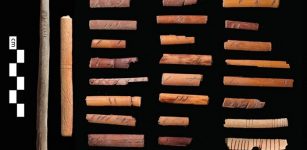 America’s First Casino Was Created By The Promontory Culture 700 Years Ago
Ancient History Facts | Apr 30, 2016
America’s First Casino Was Created By The Promontory Culture 700 Years Ago
Ancient History Facts | Apr 30, 2016


